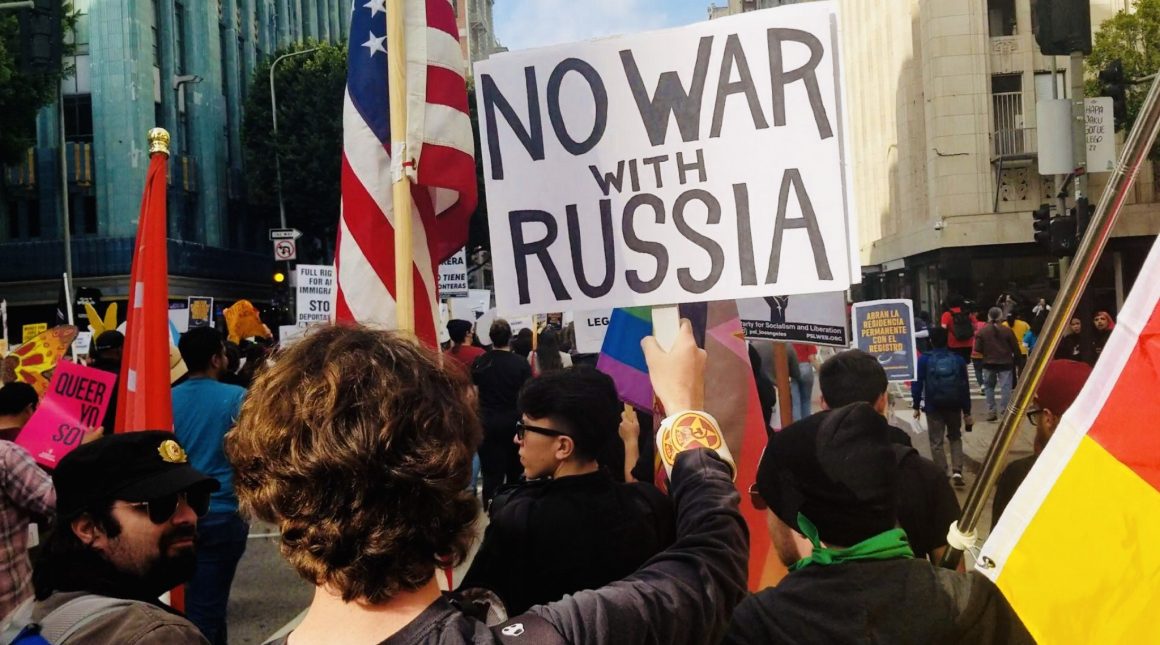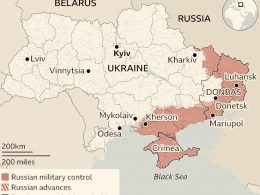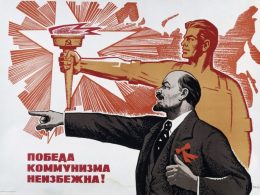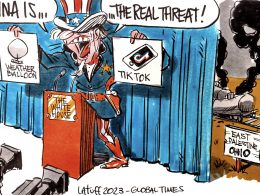Picture from May Day.
When the U.S. empire decided to provoke war with Russia, it unwittingly catalyzed a process of transformation in the U.S. proletariat that has the potential to end American capitalism. The war’s aim was to reverse the decline of U.S. hegemony by subduing China, a task that depends on destabilizing Russia. When the sanctions not only did far less damage than anticipated, but couldn’t stop Russia’s economy from growing after the initial shock, it became undeniable that this plan wasn’t realistic. There can be no undoing of the shift towards multipolarity, the conflict has ultimately accelerated this shift by creating more BRI expansion opportunities. Which means that even though the oil and arms industries have benefited from the war, the deeper basis for American capitalist strength—this being U.S. global dominance—is disappearing. That means the strongest link in the chain of American bourgeois power, which is American capitalism’s ability to displace its crises globally, is weakening.
What this weakening looks like in practical terms is a vast, sudden expansion in the amount of U.S. workers who are compatible with anti-imperialism. And who therefore have the consciousness and will to fight for their rights in the only way that can bring them victory: by fighting in solidarity with the peoples worldwide who are targeted and exploited by imperialism. As soon as a worker in the imperial center starts fighting not just for their own interests, but for the interests of all workers, they’ve become a serious threat towards the ruling class. This is because when a worker in the core lacks anti-imperialist consciousness, their struggle is co-optable. They can be diverted towards reformist and opportunist projects that don’t fundamentally threaten capital, because capital in the core can only be fought on the basis of proletarian internationalism. On the basis of freeing not just the workers in this country, but the workers in the countries that the imperialist powers exploit.
With this year’s rise of an anti-NATO movement, that’s the character the American labor struggle has gained the potential to embody. I say “the potential” because the labor movement hasn’t attained this anti-imperialist nature, not yet. That will require work from communists who are serious about anti-imperialism to inject our ideas into the labor movement, to make opposition towards NATO, the Democratic Party, and imperialist militarism normalized within the spaces workers are using to assert their rights.
The significance of the Ukraine proxy war’s failure, of the backfiring of Washington’s attempt at destabilizing Eurasia, is that it’s introduced the conditions which make this project of ours viable. Which make it possible to incorporate the fight against empire into the domestic fight against capital, and bring America’s increasingly radicalized proletarians towards a workers rights/anti-imperialist synthesis. The proxy war’s failure has done this by placing our ruling class in a compromising situation. A situation where it has to continue the policies which drive down the living standards of the core’s workers, or else give up the marginal benefits it’s gained from the conflict.
Even though U.S. hegemony has been further diminished by the war, internally it’s provided the empire with some advantages: expanded NATO loyalty among the European countries, an opportunity for price gouging and monopolization that’s brought record oil profits, a military-industrial complex profit source to replace the one in Afghanistan, an atmosphere of xenophobia that’s created the narrative precedent for targeting dissent. If the war ends, all of these good things for the empire will go away, and all it will be left with are a devastated economy and an upset population. Which means the ruling class has to indefinitely continue the destructive militarist policies that are worsening the living standards crisis, and thereby escalating class conflict.
Under these circumstances, we Marxists have an exceptionally strong case to make to the workers. It’s readily apparent that their government makes decisions based off of what corporate interests mandate, that the USA uses ridiculous amounts of its people’s tax dollars to butcher human beings around the globe, and that our leaders—including the “progressive” party the Democrats—are willing to sacrifice our economic wellbeing for the sake of these wars. Upon being presented with these realities, the workers are increasingly coming to the conclusion on their own that they must mobilize to defeat bourgeois rule. What Marxists must do is provide these radicalizing individuals with the other, essential ingredient to becoming an agent for revolution, which is education on revolutionary theory.
It’s intuitive for the average person to understand that the war machine must be fought, and to have this sentiment combined with the growing worker struggles of recent years represents incredible progress. What’s not intuitive is the knowledge required for psychologically resisting imperialism’s psyops. This kind of knowledge is so important because without it, those interested in helping the anti-imperialist cause can be diverted towards ideas which allow the Democratic Party to render the cause ineffective. The ideas that cause people and organizations to oppose NATO in theory, but not in practice.
The two big ideas that have this diluting impact are the notion that we should support neither NATO nor Russia, and the notion that Rage Against the War Machine’s multi-tendency anti-imperialist coalition represents a net negative for the socialist cause. One can’t effectively struggle against the former notion without also rejecting the latter. Because the argument that supporting Russia is a necessarily reactionary stance comes from the same liberal logic behind the argument that reaching beyond leftists in our practice necessarily helps reactionary politics. Both of these arguments come from the insular and gatekeeping culture that’s come to dominate the left, especially the online left. We must have the intellectual courage to be able to recognize things as true simply because they are true, without having our views dependent on what’s seen as sufficiently “leftist” within these circles.
If Russia is waging an anti-fascist war, then we should recognize it as such. If the permanent organizing coalition that RAWM has produced doesn’t include any of the culture war-obsessed types of conservatives (who only briefly attached themselves to the movement during Februrary’s rally), then this coalition is worth supporting. Especially since it also has multiple communist organizations, which are capable of acting as organizational equals to the Libertarian Party within the context of the anti-imperialist struggle. If we incorporate these realities into our ideas and practice, we’ll be in place to correctly combat the war machine. And thereby to correctly combat American capitalism.
In What Is To Be Done, Lenin wrote:
It is often said that the working class spontaneously gravitates towards socialism. This is perfectly true in the sense that socialist theory reveals the causes of the misery of the working class more profoundly and more correctly than any other theory, and for that reason the workers are able to assimilate it so easily, provided, however, this theory does not itself yield to spontaneity, provided it subordinates spontaneity to itself. Usually this is taken for granted, but it is precisely this which Rabocheye Dyelo forgets or distorts. The working class spontaneously gravitates towards socialism; nevertheless, most widespread (and continuously and diversely revived) bourgeois ideology spontaneously imposes itself upon the working class to a still greater degree.
It’s because of this observation that I’ve gone into some specifics on which ideas we must embrace to properly advance the anti-imperialist struggle. These ideas are contentious ones within the online space that I operate in, but that only further shows why they’re worth advocating for. Some of those most invested in discrediting Operation Z’s anti-fascist character, as well as in discrediting the project to build an antiwar movement independent from the Democratic Party, are people who genuinely seek to practice Marxism. And their good intentions make them all the more dangerous, because these intentions motivate them to attack the anti-imperialist movement with all the more vigor. We can’t let our thinking and practice be influenced by these actors, whose sectarianism against the most effective parts of the anti-imperialist struggle makes them aligned with the pro-NATO liberals at this stage. The class struggle is escalating, forcing the players within this power struggle to pick sides. We must pick the side that’s capable of defeating U.S. hegemony, and thereby the American capitalist state.
————————————————————————
If you appreciate my work, I hope you become a one-time or regular donor to my Patreon account. Like most of us, I’m feeling the economic pinch during late-stage capitalism, and I need money to keep fighting for a new system that works for all of us. Go to my Patreon here.








